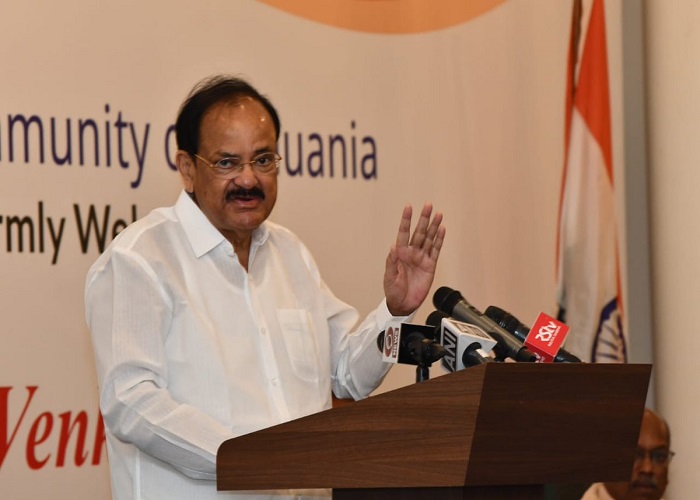Highlighting the importance of preserving, protecting and promoting Indian languages, the Vice President of India, Shri M Venkaiah Naidu today spoke in 22 languages at an event to mark International Mother Language Day in New Delhi. He urged all the citizens to take a pledge to promote mother tongue and also learn other languages.
The Vice President called for a national movement to promote Indian Languages in a big way, and said: “When we protect and promote mother tongues, we protect and promote linguistic and cultural diversity also.”
Calling for a link between the language and employment, the Vice President said that knowledge of Indian languages must be made compulsory for recruitment up to a certain level in government jobs.
Stating that language should become a catalyst for inclusive development and growth, Shri Naidu stressed the need to use local language in administration.
Shri Naidu also said that medium of instruction should be mandatory in languages up to high school level.
He appreciated the Supreme Court for providing judgment copies in six languages and wanted all other subordinate courts to follow the same.
Emphasizing the importance of protecting and conserving India’s unique and rich linguistic heritage, the Vice President said that celebration of Matribhashas should not remain a one-day affair and wanted all citizens to use their respective mother tongue on a daily basis. “Only then the celebration of this kind will attain serious meaning,” he added
Observing that more than 19,500 languages and dialects are spoken in India as mother tongues, he said that the languages were a repository of collective knowledge and wisdom amassed over the course of the long journey of our vibrant civilization.
Shri Naidu said that Indian languages have always been celebrated for their scientific structure and phonetic, uncomplicated spellings and clear grammatical rules. “Our languages have been vehicles of our vast and highly sophisticated ancient, medieval, and modern literature,” he added.
Recalling the wise words of Father of the Nation, Shri Naidu said that Mahatma Gandhi had reminded the country that mother tongue should not be neglected but this did not mean that one need not learn other languages like English.
Shri Naidu quoted Mahatmma Gandhi as saying “I do not want my house to be walled in on all sides and my windows to be stuffed. I want the cultures of all the lands to be blown about my house as freely as possible. But I refuse to be blown off my feet by any.”
Referring to thoughts of Sardar Patel who in a similar vein said that children taught in a foreign language were forced to memorize the words without understanding and “when cramming power increases, understanding power decreases.”
Quoting from Sardar Patel’s Nagpur University convocation address he said “Your University has shown that where there is a will there is a way. I hope you will follow this well thought plan with determination and when Indian language is used as medium you will see that a lot of time of students saved, their intelligence blossoms and minds become sharp.”
Pointing out that a language evolves with human evolution and gets nourished by constant use, the Vice President said “If you do not use a language, you lose it. When a language declines, it takes with it an entire knowledge system.”
The Vice President appreciated the HRD Ministry for organizing the celebration of International Mother Language Day in one lakh schools across the country on February 21.
Earlier, upon his arrival, the Vice President was welcomed in 22 Indian languages by students dressed in traditional Indian attire representing the vibrant culture of different states. He also visited bookstalls set up by various central governmental institutions.
The Minister of HRD, Shri Ramesh Pokhriyal ‘Nishank’, Minister of State (I/C), Ministry of Culture, Shri Prahlad Singh Patel and the Minister of State, Ministry of HRD, Shri Sanjay Dhotre and the Secretary to the Vice President of India, Shri I.V. Subba Rao, and the Secretary (Higher Education), MHRD, Govt. of India Shri Amit Khare, and, the Secretary, Ministry of Culture, Shri Yogendra Tripathi.
Following is the full text of speech –
“Sisters and brothers,
I am delighted to be here with all of you to celebrate the International Mother Language Day.
International Mother Language Day was initially mooted by Bangladesh and UNESCO General Conference approved the proposal in 1999. This has since been observed throughout the world since 2000.
India, like UNESCO, believes in the importance of cultural and linguistic diversity for sustainable societies. We strongly believe that we must collectively preserve our linguistic heritage.
It is worth noting that globally 40 percent of the population does not have access to an education in a language they speak or understand. India shares UNESCO’s perspective on linguistic diversity and believes that mother tongue-based multilingual education is very important.
Sisters and brothers,
I have always emphasized the importance of protecting and conserving our unique and rich linguistic heritage.
The great Indian poet Acharya Dandi, had said that if the light of language does not exist, we will be groping in a dark world.
Language illuminates our world, makes it easier for us to understand the world and fellow human beings.
Language is a tool for intellectual and emotional expression.
Language is a vehicle of intergenerational transmission of culture, scientific knowledge and a worldview.
Language shapes the cultural life of a nation and lays the foundation for its progress.
Language is the vital, unseen thread that links the past with the present.
We, in India, are fortunate to be heirs to a great linguistic tradition. Our country is a linguistic treasure house. Ours is a nation that is widely acknowledged for its extraordinary linguistic and cultural diversity. The plurality and co-existence of multiple languages add color and vitality to our country and makes it unique.
Indian languages have always been celebrated for their scientific structure and phonetic, uncomplicated spellings and clear grammatical rules. Our languages also been vehicles of our vast and highly sophisticated ancient, medieval, and modern literature.
More than 19,500 languages or dialects are spoken in India as mother tongues, according to the Language Census.
There are 121 languages which are spoken by 10,000 or more people in India.
Our languages are a repository of our collective knowledge and wisdom which we have amassed over the course of the long journey of our vibrant civilization.
Our tribal languages, many of which are headed towards extinction, contain invaluable knowledge about a region’s flora, fauna and medicinal plants.
Sisters and brothers,
Language evolves with human evolution and gets nourished by constant use. If you donot use a language, you lose it.
When a language declines, it takes with it an entire knowledge system.
The traditional livelihood patterns disappear along with their special skills, arts, crafts, cuisine and trade.
We must not allow this to happen.
Language preservation and development needs a conscious, concerted action. It has to be a multi-pronged approach.
We must start by offering in our schools a curriculum in which the mother tongue of the learners is the medium of instruction at least at the primary level if not high school.
A number of studies conducted all over the world by different expert groups have established the fact that teaching of mother tongue at the initial stages of education gives impetus to the growth of mind and thought and makes children more creative and logical.
At the same time, we must encourage our children to learn multiple languages in order to widen their horizons.
Let me recall, in this context, the wise words of Mahatma Gandhi. He had said, “I do not want my house to be walled in on all sides and my windows to be stuffed. I want the cultures of all the lands to be blown about my house as freely as possible. But I refuse to be blown off my feet by any.”
He had reminded us that mother tongue should not be neglected but this did not mean that one need not learn other languages like English. As he said, “I would have our young men and young women with literary taste to learn as much of English and other world languages as they like, and then expect them to give the benefits of their learning to India and to the world, like a Bose, a Roy or the poet himself. But I would not have a single Indian to forget, neglect or be ashamed of his mother-tongue, or to feel that he or she cannot think or express the best thoughts in his or her own vernacular.”
In a similar vein, Sardar Vallabhbhai Patel had also said that children taught in a foreign language are forced to memorize the words without understanding and “when cramming power increases, understanding power decreases.” In 1946 while addressing the convocation of Nagpur University he further elaborates on the theme of mother tongue education in the following words: “Your university has shown that where there is a will there is a way. I hope you will follow this well thought plan with determination and when Indian language is used as medium you will see that a lot of time of students saved, their intelligence blossoms and minds become sharp.”


